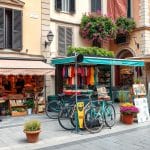Welcome to our detailed guide for UK expats wanting to buy property in Italy. This guide covers everything, from dreaming of living in a Tuscan farmhouse to finding that coastal retreat. It explains the legal stuff and helps you find the ideal location. We have all the info you need.
- The Property Market in Italy
- Foreigners Buying Property in Italy
- Property Prices in Italy
- Best Places to Buy Property in Italy
- Finding a Property in Italy
- Pitfalls to Avoid When Buying Property in Italy
- Choosing the Right Property in Italy
- Steps to Buying Property as a Foreigner in Italy
- Legal Requirements for Buying Property in Italy
- Bank Accounts in Italy
- Fiscal Code in Italy
- Hidden Charges in Buying Property in Italy
- Conclusion
- Additional Resources
- References
- FAQ
- Source Links
Key Takeaways:
- Buying property in Italy is a wise choice for UK expats.
- Italy’s property market stays strong, even in tough times.
- Foreigners, like you from the UK, face few limits when buying there.
- What you’ll pay for property in Italy changes by area. Sometimes, you can find cheap options.
- Places like Sardinia, Lombardy, Tuscany, and Sicily are top picks for UK expats.
The Property Market in Italy
Italy’s property market is still a great choice for investment. It has stayed stable even through the pandemic’s economic shocks. According to Idealista, house prices in Italy rose by 1.1% in real terms up to February 2021.
Factors Contributing to Italy’s Property Market Appeal
Several reasons make Italy’s property market attractive:
- Stability: It’s known for being stable, which attracts both local and international investors.
- Safe Investment: Even in tough times, Italians see real estate as a valuable and secure long-term investment.
- Desirable Locations: From beautiful countryside to lively cities, Italy has something for everyone. This makes it popular among buyers.
UK expats could find good opportunities in Italy’s property market. They might see stable returns and benefit from the country’s lasting appeal.
| Advantages of the Property Market in Italy | Challenges of the Property Market in Italy |
|---|---|
|
|
Foreigners Buying Property in Italy
UK nationals and other foreigners can buy property in Italy with few hurdles. Italy welcomes all to own property within its borders. For those who lived in Italy before January 1, 2021, getting a non-EU residence permit might not be necessary to buy property.
However, you might need to show documents confirming your rights under the UK’s Withdrawal Agreement.
Property Prices in Italy
Thinking about buying a house in Italy? It’s key to know prices change a lot by where and what you buy. Some places are more affordable than others. Venice and Milan are pricey, though.
In Italy, you could find some real deals. In Sambuca, for instance, there are flats for just €16,000. And in some spots, properties go for as little as 1 euro. Delia, Troina, Salemi, and Castiglione in Sicily are among these places. They offer chances for a cheap investment.
Yet, Italy also has very expensive homes. Luxury places in top spots can cost a lot. These are for those wanting something very special.
If you’re looking at properties in Italy, start by checking prices in the area you like. This helps to set a realistic budget. Getting help from a good real estate agent is also smart. They can make the buying process much easier.
Best Places to Buy Property in Italy
If you’re a UK expat looking to buy property in Italy, check out these great spots. Here are some top choices:
Sardinia – Costa Smeralda
Costa Smeralda in Sardinia is known for its beautiful beaches and high-end image. It’s perfect for those wanting a piece of the Mediterranean dream. The area has clear waters, top-class resorts, and stunning scenery.
Lombardy – Italian Lakes
Head to Lombardy’s Italian Lakes for amazing natural views and fun activities. Places like Lake Como and Lake Garda are not just beautiful but also offer a range of outdoor adventures. The beauty of the lakes draws people from everywhere.
Tuscany, Umbria, and Abruzzo
If you dream of a quiet life in the countryside, Tuscany, Umbria, or Abruzzo might be for you. These places are full of rolling hills, vineyards, and old towns. They offer a peaceful break from the rush of city life.
Sicily – Catania
Looking for a good deal? Catania in Sicily has great options for less money. It has low-cost homes, and is surrounded by beautiful olive groves and vineyards. This means you can enjoy Sicily’s beauty without spending a fortune.
| Location | Key Features |
|---|---|
| Sardinia – Costa Smeralda | Stunning coastlines, luxurious resorts |
| Lombardy – Italian Lakes | Breathtaking lakes, outdoor activities |
| Tuscany, Umbria, and Abruzzo | Rustic countryside living, vineyards |
| Sicily – Catania | Affordable properties, olive groves, vineyards |
Finding a Property in Italy
Finding a property in Italy? It’s smart to use a local real estate agent. They know the Italian market well. Many UK buyers choose agents who speak Italian and understand the local market. This can make your search easier and open up more options.
But, it’s good to do your own research too. Start by checking out Italian property websites. Sites like Italian Houses For Sale, Toscana Houses, Lionard, Viviun, and Romolini have loads of listings. They can help you find properties all over Italy.
Pitfalls to Avoid When Buying Property in Italy
When you buy a property in Italy, it’s crucial to avoid common issues. This helps ensure a smooth experience and protect your investment. By knowing about these pitfalls, UK expats can make smart choices.
Falling Victim to Scams
Watch out for scams when buying a property. Never buy just from photos or online details. Always visit the property yourself. This way, you check if it matches your needs and avoid bad surprises.
Verifying the Seller’s Rights
Check that the seller has the right to sell the property. Ensure they can legally transfer ownership. Do this by checking all papers and talking directly with the seller.
Unreliable or Incomplete Information
Be wary of incomplete information from sellers or agents. They might not mention all issues. To lessen this risk, work with a trustworthy local real estate agent. They can offer honest details.
Not Seeking Professional Advice
Skipping professional advice is a big mistake. Italy’s property buying process can be tricky. Always get help from experts in Italian real estate law. They can help with contracts and ensure everything is legal.
Underestimating Additional Costs
Don’t forget about extra fees when you buy property in Italy. These can include taxes and notary fees. Be sure to include these costs in your budget. This helps avoid big financial hits later on.
Knowing these pitfalls and taking steps to avoid them is key for UK expats in Italy. With the right advice and care, buying property in Italy can be a rewarding endeavour.
Choosing the Right Property in Italy
The key to finding the right property in Italy is matching it with your needs. Think about what you want your home to be like. Make sure you pick wisely by looking at:
Location
The location of a property is very important. Think about what you like, such as city life, the silence of the country, or the sea. Each part of Italy reflects its unique beauty, so look for places that fit your lifestyle.
Property Type
In Italy, there is a property type for each person’s taste. You can find detached houses, apartments, or lovely villas. Think about what you need in terms of space, design, and features for you and your family.
Condition
Checking the condition of a property is vital before you buy. If it needs fixing up, you should get a professional to look over it. They check everything from the structure to the plumbing. They also look for things like asbestos. Older properties might need more work, so keep that in mind.
| Location | Property Type | Condition |
|---|---|---|
| Tuscany | Villa | Renovated |
| Lake Como | Apartment | Modern |
| Sicily | Detached House | Restoration needed |
Table: Examples of properties available in different locations in Italy
Think about where it is, what kind of home it is, and if it needs work. By considering these, you’ll find the perfect home that’s also a great investment. Take your time and get advice from experts before deciding.
Steps to Buying Property as a Foreigner in Italy
Looking to buy property in Italy as a foreigner? The process might seem complex but breaking it down helps. Follow these steps to move through the Italian real estate market.
- Research mortgage options to find what’s best for you. This is key for setting your budget and making a plan.
- Engage with a realtor experienced in helping foreigners buy in Italy. They’ll provide local insight and match you with fitting properties.
- Choose a property and make your offer. A realtor will assist in the negotiation phase, ensuring you understand all terms.
- Get a sale contract drawn up after your offer is accepted. Review this document thoroughly and consider seeking legal advice before signing.
- Signing the contract happens in front of a notary. This legal expert checks the deal to make sure it’s fair and according to law.
- Prepare to pay various taxes. These include the registration and mortgage tax, due before you finalise the purchase.
Estimated Timeline:
Becoming a property owner in Italy usually takes about six months. This timeframe is an average. It can change due to different factors in your specific situation.
| Step | Timeframe |
|---|---|
| Research mortgage options | 1-2 weeks |
| Engage a realtor | 1-2 weeks |
| Select a property and make an offer | Varies |
| Obtain a sale contract | 2-4 weeks |
| Sign the contract | 1 day |
| Pay taxes | 2-4 weeks |
| Total | Around 6 months |
The six-month estimate is a guideline. Your own process might be quicker or slower depending on your deal’s specifics. Partnering with skilled professionals can make your journey smoother.
Legal Requirements for Buying Property in Italy
Before buying property in Italy, foreign buyers must know a few legal rules. The process is easy if you follow these rules. Knowing and obeying these laws ensure your buying trip is without trouble.
Engaging a Notary
Engaging a notary is crucial in Italy. They check all paperwork and make sure the deal is fair and legal. Be sure to pick a notary who knows about Italian property law.
Translator Services
Even though it’s not a law, foreign buyers should consider a translator. This is important if you’re not fluent in Italian. A translator will make sure you understand every detail of the contract and other papers.
Deposit and Preliminary Contract
Usually, you need to pay a deposit when you bid on a property. This shows the seller you’re serious. If you back out after the bid is accepted, you might lose this money.
After the bid, you sign a preliminary contract and pay another deposit. This deposit is a portion of the property’s price. It secures the property until the final deal is ready.
Taxes and Fees
Buying property in Italy comes with some tax costs. There’s a registration tax and a mortgage tax. The first one, a part of the property’s value, goes to the local tax office.
The mortgage tax’s rate depends on how much you’re loaned. Before buying, make sure to check with a professional. They can tell you all the costs and help you through the process.
| Tax/Fee | Description |
|---|---|
| Registration Tax | A percentage of the property’s value paid to the local tax office. |
| Mortgage Tax | Applicable if obtaining a mortgage, the percentage depends on the loan amount. |
Bank Accounts in Italy
Opening a bank account in Italy is a key step for those buying property there. But, it comes with its own set of challenges.
Many Italian banks ask for face-to-face meetings to open an account. This makes it hard for people not in Italy to finish the required paperwork and hand over documents.
Luckily, there are ways around this tough rule. For instance, you can choose someone you trust in Italy to handle things for you. They could be a lawyer or financial advisor. This person would do the account opening steps for you.
Another way is to use something called an escrow account for your payments. It holds your money until it’s safe to hand it over, like after buying a property. This keeps your transactions safe and easy.
Foreign buyers need to look into their options before getting a bank account in Italy. Getting help from pros used to international deals and property buying is wise too.
Fiscal Code in Italy
In Italy, the fiscal code or Codice Fiscale identifies individuals for tax purposes. You need it for many things, like buying property, getting insurance, paying taxes, and opening a bank account.
If you’re a foreigner buying property in Italy, you must get a Fiscal Code. This code acts as your financial ID in the country.
To get a Fiscal Code, visit an Italian tax office or consulate. Bring your passport or ID and fill out some forms.
The tax office will then give you your unique Fiscal Code. Use this code for all your property transactions in Italy.
It’s crucial for foreign buyers to have a Fiscal Code. It helps follow Italian tax rules. Get it early to avoid problems later.
Understanding Italy’s property buying process is vital. The Fiscal Code is key for financial matters and tax duties.
Hidden Charges in Buying Property in Italy
Whether you’re buying a home in Italy, watch out for sneaky costs. These extra charges might surprise you and increase your total expenses. To stay on top of things, get a professional to explain all the costs. This way, your buying journey can be smooth.
Registration Tax
The registration tax is an extra cost when you buy property in Italy. Also called Imposta di Registro, it’s paid when the sale is officially registered. This tax varies based on the use of the property, like if it’s for living in or for business. Remember to include this in your total spending plan.
Mortgage Tax
If you use a mortgage to buy your place, you’ll face another fee. The mortgage tax, or Imposta Ipotecaria, is what you pay on your loan. It changes with your loan amount, and is usually a part of what you borrow. Think about this tax when you’re picking a mortgage. It’s part of your total cost.
Knowing about these hidden costs helps you plan better. It means you won’t be caught off guard with extra payments while buying your dream home in Italy.
Conclusion
Buying property in Italy as a UK expat can be very rewarding. With the right info and help, it’s not so hard to do. You need to know about the market, the laws, and the risks to make good choices. Then, finding your dream property in Italy can become a reality.
Additional Resources
Want more help buying a home in Italy? Try getting advice from Italian property experts. Experts for Expats can introduce you to professionals. These experts offer free guidance and support to buyers, helping them navigate the purchase.
References
Want to know more about buying a property in Italy? Check out these resources:
- “Considering moving to Italy? Here’s what you need to know before you buy a home”
- “Italy’s property market: national overview and the alterations after Covid-19”
- “Buying Property in Italy After Brexit: Rules and Practicalities for UK Expats”
- “Buying property in Italy as a non-resident”
- “The price of life in Italy’s Sambuca ‘ghost village'”
- “These Italian towns will pay you to move in”
- “Property Prices in Italy”
- “How Long Does it Take to Buy a House in Italy?”
- “Buying property in Italy: what to expect”
- “How to open an Italian bank account from abroad”
- “How to get a Codice Fiscale in Italy: The Ultimate Guide”
- “Italy introduces higher stamp duty rates for second homes”
- Personal Experience and Research
These references share insights on buying in Italy. They talk about market changes, legal rules, and what to expect. They will help if you want to buy property in Italy as a UK expat.













